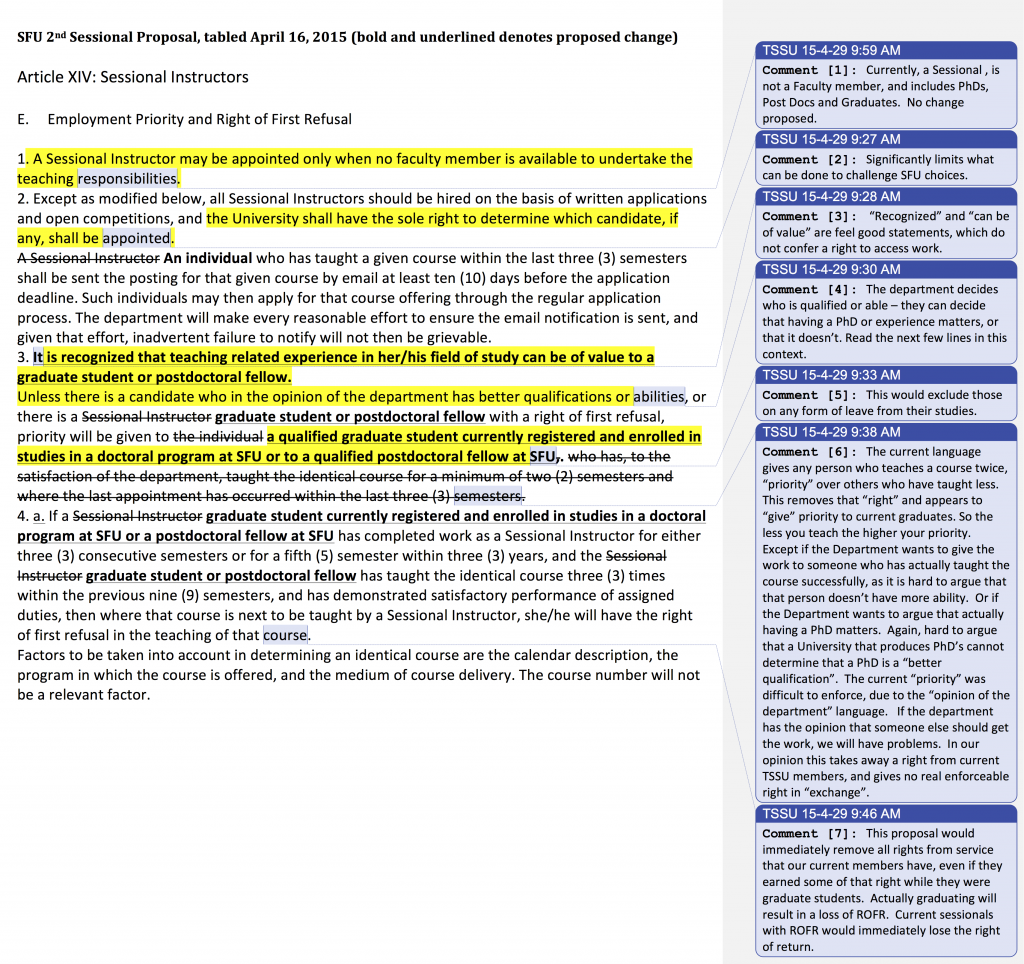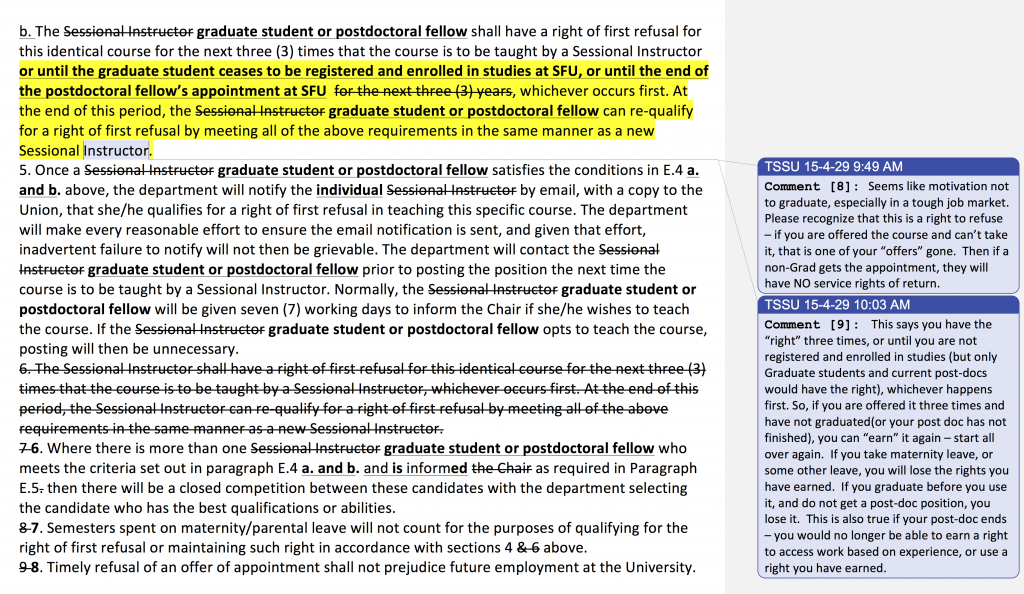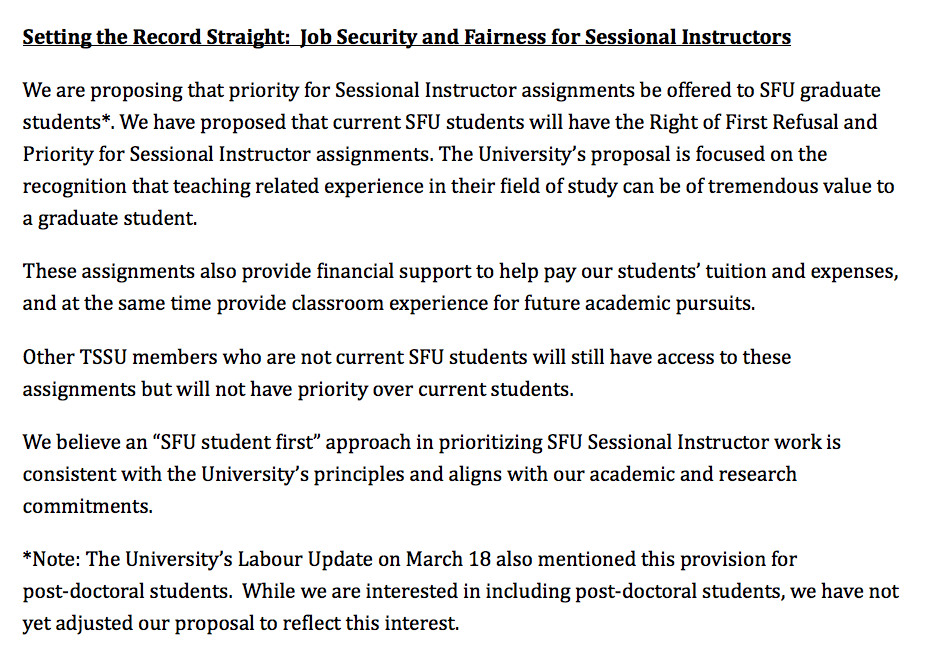On April 13th, 2015, the Employer posted and emailed broadly throughout the community a “sessional” update, borrowing the TSSU headline of “Job Security and Fairness for Sessional Instructors." The post appears to be in response to an explanation that the TSSU gave its members (March 23, 2015). Both are posted below for your reference.
In contract negotiations, the rights set out in the Collective Agreement come down to the words on the page, and the ability to enforce them. Many are asking why there is such a discrepancy between how TSSU sees the Sessional discussions at the bargaining table and how the Employer reports it.
You should be the judge of which proposal delivers on the promise of “Job Security and Fairness for Sessional Instructors.”
TSSU has tabled a full Sessional proposal: 1) to better reflect the workload that comes with larger classes by paying more money or appointing TAs; 2) to provide basic employment seniority rights for successful teachers; 3) to require that a Sessional be provided with a copy of relevant policies and procedures; 4) to set aside a percentage of Sessional positions within each department for graduate students, and graduate students could, just like now, compete for the other positions as well as earning seniority rights that they can use after they graduate; 5) to automatically progress Sessionals to “Lecturer” positions after a certain number of sessional appointments.
There are other proposals that are important to teachers—protection of intellectual property rights, for example—but we have explained in the past that, without a seniority system to guarantee a measure of job security, Sessionals have little if any ability to enforce their rights under the collective agreement because anyone who insists on those rights will simply find themselves out of work.
Among its many proposals for TAs, the TSSU has also repeatedly stated that we have to address the fact that 25% of all TA/TM appointments are going to candidates who are not Graduate students, which is a failure of the system because those appointments are specifically designed to provide funding as well as teaching experience to Grads. Some departments have created systems that do deliver work to Graduates, though, so the TSSU has proposed that SFU should use those "best practices" across the University.
The employer, on the other hand, has tabled a proposal that they claim is motivated by the need to give more work to Graduate students, but it would (allegedly) give them work in the form of Sessional appointments. Sessional work, though, is very time consuming, so it pays less per hour than TA/TM work. Nevertheless, they have told us that they are not interested in changing how access to TA/TM work is done, and will instead focus on their Sessional proposal.
So, let’s look at their latest proposal with two questions in mind. First: is more Sessional work for Graduates a real solution? Your contract committee does not think it is, and we addressed this problem in our March 23rd, 2015 post. Second: does this proposal actually provide an enforceable way to give Sessional work to graduates, or is it a thinly veiled effort to remove what little rights Sessionals have attained over the years? Your contract committee thinks that it is, and in the comment boxes below, we've explained why.
(In proposals, words struck out are to be removed, and words in underline/bold-face are to be added.)


For comparison, here are the employer's claims their proposal would do:
 And finally, here's what we said March 23, 2015.
And finally, here's what we said March 23, 2015.
Job Security & Fairness for Sessional Instructors
Sessional instructors are a critical part of the teaching team at SFU. Improving the rights of sessionals is fundamental to sustaining an education system based on the principles of academic freedom and teaching excellence.
Job security through seniority
What rights do you have if exercising them costs you your job? TSSU fields regular conversations with sessionals who are being mistreated, often in violation of the Collective Agreement, and unable to bring their complaints forward because asserting their rights may result in not being rehired.
TSSU wants a Sessional seniority system that recognizes and values those who successfully teach for SFU. Some TSSU Sessionals have taught courses dozens of times and have been fixtures in their departments for decades. Attaining recognition that Sessionals perform valuable work will benefit future teachers at SFU, just as the work of unions at other Universities will benefit TSSU members who may go there to work.
Universities recognize Faculty service with an advancement system toward tenure. In recent years, numbers of teaching staff without tenure or job security has been on the rise, often referred to as adjunct labour — at SFU they are called Sessionals. In the US, 70% of all teaching in universities is done by adjuncts. Sessionals at SFU currently teach an average of 25% of courses, and now form a critical part of the teaching team at SFU. The expanding use of adjunct sessionals without the protection of academic freedom demonstrates a need to improve seniority rights for Sessionals here, just as our fellow Unions are doing elsewhere.
Unions at both York University and the University of Toronto have engaged in struggles to improve seniority rights for their Sessional Instructors. Both of these Unions have real job security and a pathway to permanent jobs for their sessional instructors. Seniority ensures that sessionals are able to exercise their labour rights effectively and it also forms the basis from which all other rights, such as academic freedom, arise.
What are the bargaining issues?
TSSU has proposed a seniority system where successful Sessionals accrue seniority with teaching service, with a percentage of positions reserved for graduates (though graduates can also be awarded other positions).
The employer has proposed taking away all rights of first refusal (ROFR) from current Sessionals who have earned it. The proposal only allows “graduate students actively engaged in coursework at SFU" to attain and use ROFR and perversely this earned right to teach will disappear as soon as you graduate. This concession would eliminate the current limited rights of first refusal, while offering no benefit to graduate students. This proposal does not give Sessional work to graduates, and actually allows the employer free reign to “fire” any successful sessional(Graduate student or not), simply by not offering another appointment.
The following are problems with this proposal:
- It removes the very limited job security Sessionals currently have
- Graduate students can already earn priority and ROFR! This proposal would limit the application of ROFR to Graduates “actively doing coursework” and stop them from using it to access work upon graduation.
- Sessional work is more time consuming, and therefore pays less per hour than TA work. While pressure builds to decrease completion times, graduates doing more sessional work to support themselves makes little sense. We would expect departments to tell those with Sessional work that they should not expect to receive TA appointments, because they could access Sessional appointments.
- It moves away from creating enough security for Sessionals to file a grievance to assert their rights. Seniority rights mean members can feel secure and able to step forward. As Sessionals are already unable to stand up for themselves, this proposal would allow the employer to worsen working conditions and justify their actions by the lack of complaints from those precarious workers.
- There are departments where graduate students need additional access to work. Across the university, almost 25% of TA work goes outside the graduate population. TSSU has proposed a solution that delivers work and funding to graduates through TA work. The Employers proposal does not deliver any additional support to the graduate population.
SFU’s proposal cynically asks TSSU members to give up the limited rights we have now, driving experienced teachers to other places where seniority rights have been won. We know our members understand this need to pay it forward – that is why for over 35 years, TSSU members have fought for rights which serve the interests of the institution and its purposes by supporting graduate work and good teaching.
The current limited Rights of first refusal (ROFR) for Sessional Instructors
Sessional instructors currently have a limited right of return called the right of first refusal. This right is very problematic and TSSU believes it needs to be replaced by a more comprehensive seniority system. First, a Sessional must teach as a “Sessional Instructor” for either three consecutive semesters, or for five semesters in three years. In addition, one must teach an identical course three times in order to earn this right. After those two criteria are satisfied, the next three times that identical course is to be taught by a Sessional, that Sessional must be offered the course, for first refusal. After those three offers, the Sessional must begin the process from the beginning to re-earn the right.
Sessional positions as a career path
Many great instructors find sessional positions are not a career path towards a permanent teaching job. University Administrators realize that they can hire sessionals at lower rates with minimal benefits and save significant money in their budgets. TSSU wants to ensure that successful sessional instructors have a ladder to a permanent teaching position.
This career path is the future for many current PhD students and securing seniority rights ensures current PhD students get the same opportunity for permanent work as previous generations. Without a ladder out of sessional work, current instructors will be stuck in an endless loop of precarious work without ever being able to belong to the university community. TSSU also recognizes that in some disciplines the ladder into sessional work starts during graduate studies.
Sessional instructors are dedicated teachers, often winning teaching awards, and valuing their work strengthens teaching excellence at SFU. These instructors should not be stuck in a system where they have to reapply for their careers every 4 months.
Let’s Stand Up Together!
Over the past 35 years, TSSU members have fought for rights that support the core principles of education at SFU. At times, our members have also had to defend the interests of the institution, our members, and the public when these have been threatened. Today we must defend the rights of Sessionals by standing together. We must defend against a proposal that threatens SFU's founding principles of academic freedom and teaching excellence by further eroding the job security instructors need to assert their rights. We must stop this proposal that weakens our members' fair access to decent work by taking away the existing rights of return from all current sessionals, and, upon graduation, eliminates any right to work graduates have earned. Finally, we must make it clear that this proposal doesn't deliver any additional funding to the graduate population and cynically asks TSSU members to give up the limited rights we have now. A better future is possible. We need to collectively say YES to earned job security for successful teachers.



